‼️❗️❣️ The supplement of this paper is amazing and well worth a read if you are interested in K-12 STEM belonging!!!!
09.02.2026 17:45 — 👍 6 🔁 1 💬 0 📌 0
What an incredible resource and comprehensive paper by this team on the development of STEM belonging, including of gender differences in STEM belonging, across K-12! A critical resource and review on this topic!
09.02.2026 17:43 — 👍 4 🔁 0 💬 0 📌 0
🚨 @drkellyallen.bsky.social's new paper features interviews with 10 belonging scholars on the Integrative Framework of Belonging, offering novel insights that clarify, deepen, and reshape the model! link.springer.com/article/10.1...
24.09.2025 21:57 — 👍 3 🔁 2 💬 0 📌 0
Surprised that psychologists are still having the same arguments about whether what happens inside people’s heads matters for choices & success? I am! But fortunately @drmuenks.bsky.social and @carltonfong.bsky.social are here to reiterate the overwhelmingly convincing case that motivation matters!
13.08.2025 16:50 — 👍 8 🔁 1 💬 1 📌 0

Beyond Behaviorism: Why Student Motivation Matters (opinion)
Understanding the science behind motivation is crucial for supporting student learning, Katie Muenks and Carlton Fong write.
Co-authored with @drmuenks.bsky.social, our @insidehighered.com piece "Beyond Behaviorism: Why Motivation Matters" is out!
We reject behaviorist principles and argue that understanding the science behind motivation is crucial for supporting student learning.
www.insidehighered.com/opinion/view...
13.08.2025 12:55 — 👍 31 🔁 11 💬 2 📌 1
Excellent thread summarizing this new paper in our special issue on School Belonging in Ed Psych Review doi.org/10.1007/s106...
18.07.2025 12:49 — 👍 4 🔁 0 💬 0 📌 0
🛑🛑🛑 and read this free open access paper introducing the Brilliance-Belonging Model, which shows how cultural beliefs about ability lead to inequitable outcomes in education through perceptions of belonging and other downstream psychological mechanisms!
16.07.2025 00:08 — 👍 6 🔁 3 💬 0 📌 0
As @maeganarney.bsky.social advisor, I’m biased, but I completely agree and encourage a vote for Maegan Arney for MotSIG junior co-chair!
23.06.2025 21:15 — 👍 5 🔁 0 💬 0 📌 0
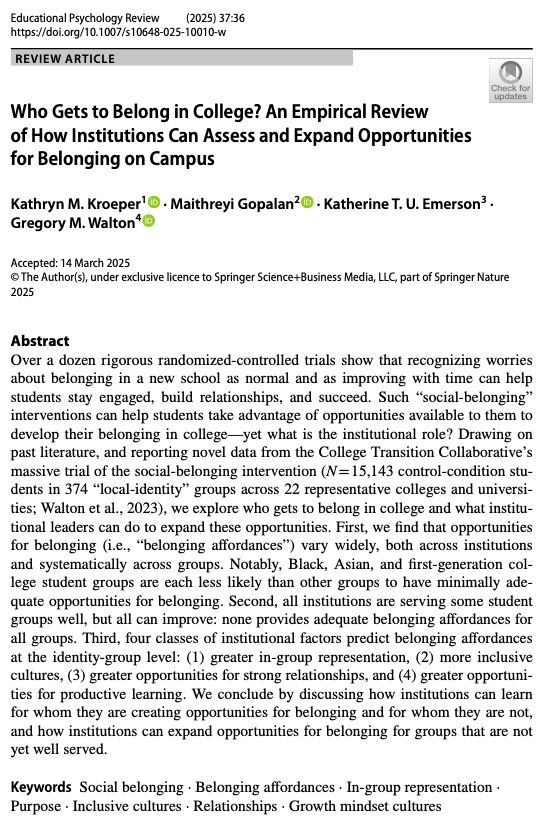
Article titled “Who Gets to Belong in College? An Empirical Review of How Institutions Can Assess and Expand Opportunities for Belonging on Campus,” published in Educational Psychology Review (2025).
Abstract: Over a dozen rigorous randomized-controlled trials show that recognizing worries about belonging in a new school as normal and as improving with time can help students stay engaged, build relationships, and succeed. Such “social-belonging” interventions can help students take advantage of opportunities available to them to develop their belonging in college—yet what is the institutional role? Drawing on past literature, and reporting novel data from the College Transition Collaborative’s massive trial of the social-belonging intervention (N = 15,143 control-condition students in 374 “local-identity” groups across 22 representative colleges and universities; Walton et al., 2023), we explore who gets to belong in college and what institutional leaders can do to expand these opportunities. First, we find that opportunities for belonging (i.e., “belonging affordances”) vary widely, both across institutions and systematically across groups. Notably, Black, Asian, and first-generation college student groups are each less likely than other groups to have minimally adequate opportunities for belonging. Second, all institutions are serving some student groups well, but all can improve: none provides adequate belonging affordances for all groups. Third, four classes of institutional factors predict belonging affordances at the identity-group level: (1) greater in-group representation, (2) more inclusive cultures, (3) greater opportunities for strong relationships, and (4) greater opportunities for productive learning. We conclude by discussing how institutions can learn for whom they are creating opportunities for belonging and for whom they are not, and how institutions can expand opportunities for belonging for groups that are not yet well served.
Although this isn’t exactly new news, I wanted to share more about a paper that came out while I was on maternity leave: “Who Gets to Belong in College? An Empirical Review of How Institutions Can Assess and Expand Opportunities for Belonging on Campus,” published in Educational Psychology Review. 🧵
13.06.2025 18:44 — 👍 24 🔁 5 💬 2 📌 0
Congratulations— SO happy for you!!!
12.06.2025 23:42 — 👍 1 🔁 0 💬 1 📌 0
I argue that historically, educational and social psychology have largely equated belonging with social connectedness. Social connectedness is, of course, essential for belonging.
24.04.2025 16:57 — 👍 2 🔁 1 💬 1 📌 0
🚨 One issue in school belonging research is we don't have a good definition for it yet! It is MUCH MORE than just positive relationships. This MUST READ paper puts forth a much needed framework for defining school belonging with important implications for research & practice bsky.app/profile/alex...
14.05.2025 21:42 — 👍 5 🔁 1 💬 0 📌 0
‼️ If you care about how institutions can support STUDENT BELONGING, make sure to read: link.springer.com/article/10.1...! They surveyed 15k+ students to uncover 4 important factors that promote belonging and found variation in how different groups of students felt belonging across context ‼️
06.05.2025 16:05 — 👍 7 🔁 3 💬 0 📌 0
Profiles in Mentoring: Katie Kroeper on Fostering Belonging through Institutional Change – The Chronicle of Evidence-Based Mentoring
Excited to be featured by the Chronicle of Evidence-Based Mentoring chatting about a recent paper with Katherine Emerson, Maithreyi Gopalan, and Greg Walton. We looked at actionable ways institutions can create belonging opportunities for students.
01.05.2025 14:00 — 👍 4 🔁 2 💬 1 📌 0
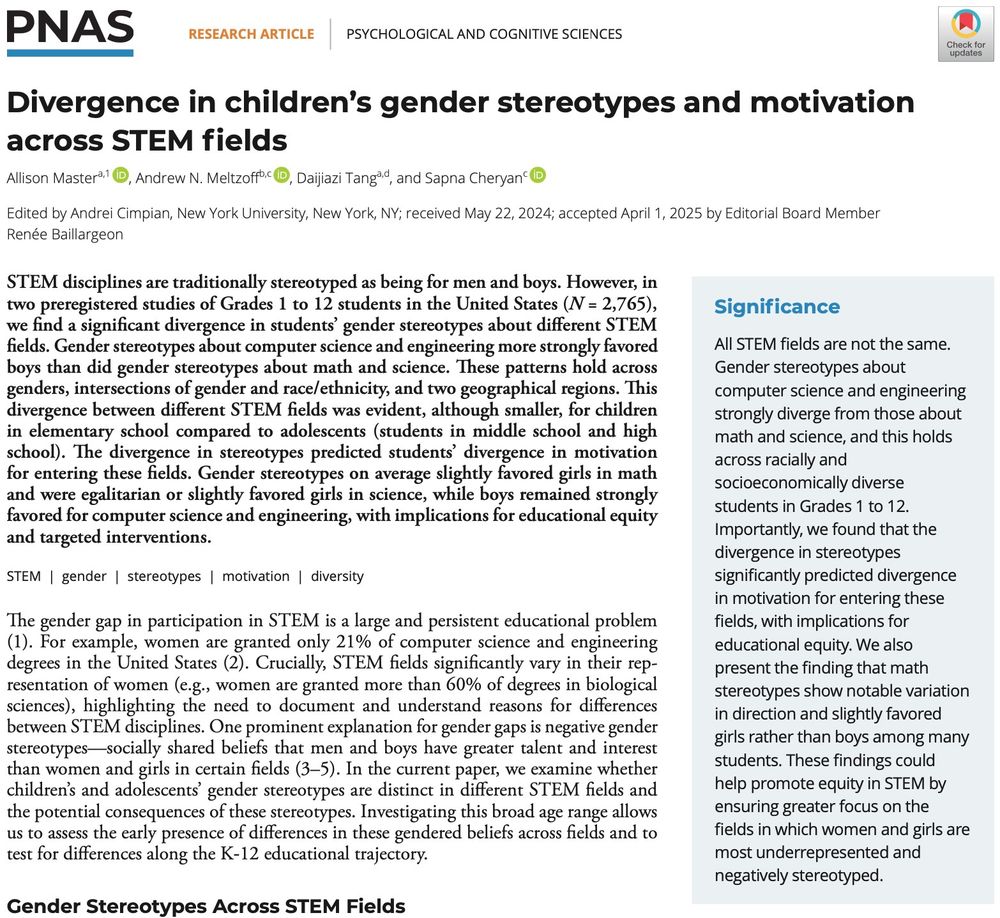
Abstract for new PNAS article
It’s a tough time for STEM education research right now, but we are still excited to share our new PNAS paper, “Divergence in children’s gender stereotypes and motivation across STEM fields”! We have big surveys (2,765 students in Grades 1-12), 2 pre-registered studies, and open data. (1/13)
02.05.2025 13:22 — 👍 92 🔁 30 💬 3 📌 4
Interesting in SCHOOL BELONGING?? We hope you can join us tonight at AERA for a mega-session on cutting edge new belonging perspectives and research!
24.04.2025 14:37 — 👍 2 🔁 1 💬 0 📌 0
🚨 Important new paper from the Ed Psych Review special issue on belonging. This paper considers how racial/ethnic identity relates to school belonging and how that might depend on whether asset-based pedagogy is being used in classrooms
25.03.2025 20:48 — 👍 10 🔁 3 💬 2 📌 0
Love this post! ❤️
21.01.2025 21:44 — 👍 0 🔁 0 💬 1 📌 0
WOW!!! This is such great news! I'm more hit or miss for seeing things on academic social media now, so I'm sorry I missed this initially, but I'm so excited to come on and see this news. Very happy to see your excellent work acknowledged in this way!
21.01.2025 21:28 — 👍 0 🔁 0 💬 1 📌 0
APA PsycNet
I don't work much with that age group, but both major K-12 belonging meta-analyses exclude elementary school/primary school students (Allen et al., 2018; Korpershoek et al., 2020). This paper is one option (but called engagement: doi.org/10.1037/a002...) or (www.tandfonline.com/doi/full/10....)
04.12.2024 01:51 — 👍 1 🔁 0 💬 0 📌 0
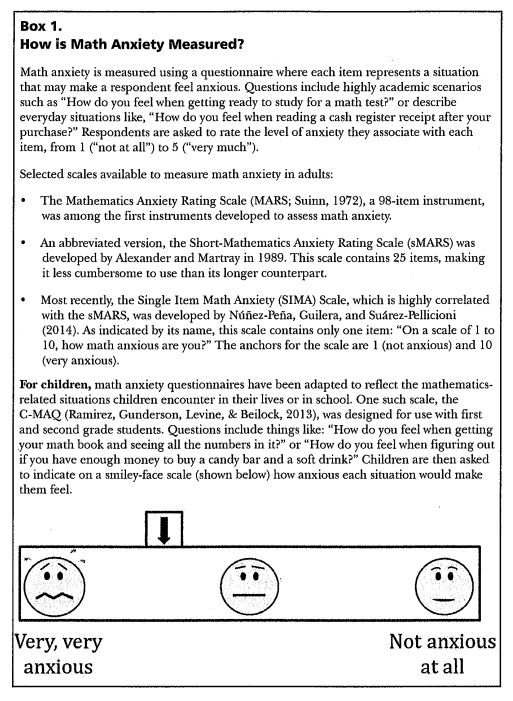
I think you would have to adapt it for children like we do with math anxiety, likely defining what you mean by belonging or comfort or acceptance, making sure they understood, & then likely use pictures to have them point to the one that matches their feelings bpb-us-w2.wpmucdn.com/sites.wustl....
04.12.2024 01:25 — 👍 3 🔁 0 💬 1 📌 0
Excited for this paper on college belonging and academic outcomes to be out now! Free view only link (rdcu.be/d2fv2). ResearchGate (www.researchgate.net/publication/...)
03.12.2024 21:42 — 👍 12 🔁 1 💬 0 📌 0
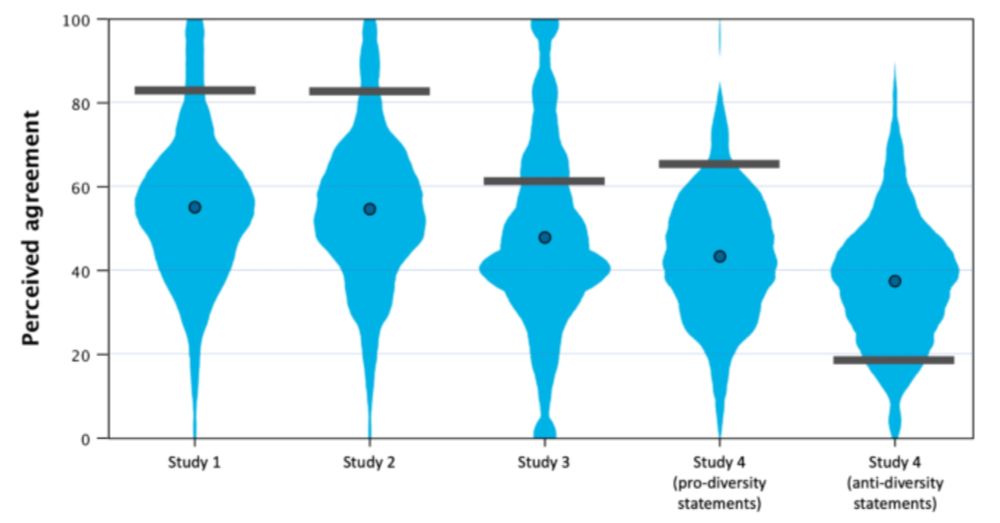
Diversity and inclusion have greater support than most Americans think - Scientific Reports
Scientific Reports - Diversity and inclusion have greater support than most Americans think
New publication alert! 🚨 My former graduate student (Dr. Naomi Isenberg) and I have a new paper in Scientific Reports about how Americans underestimate diversity support and that correcting this boosts inclusion.
www.nature.com/articles/s41...
20.11.2024 19:06 — 👍 47 🔁 18 💬 1 📌 0
‼️
19.11.2024 23:01 — 👍 1 🔁 0 💬 0 📌 0
🚨
19.11.2024 23:01 — 👍 1 🔁 0 💬 0 📌 0
APA PsycNet
For college students (psycnet.apa.org/record/2023-...). For adolescents (and generally the most popular measure), PSSM (onlinelibrary.wiley.com/doi/abs/10.1.... A short, 4-item scale for adolescents (psycnet.apa.org/record/2018-...). A discussion of measures (www.sciencedirect.com/science/arti...).
15.11.2024 00:41 — 👍 3 🔁 0 💬 0 📌 0
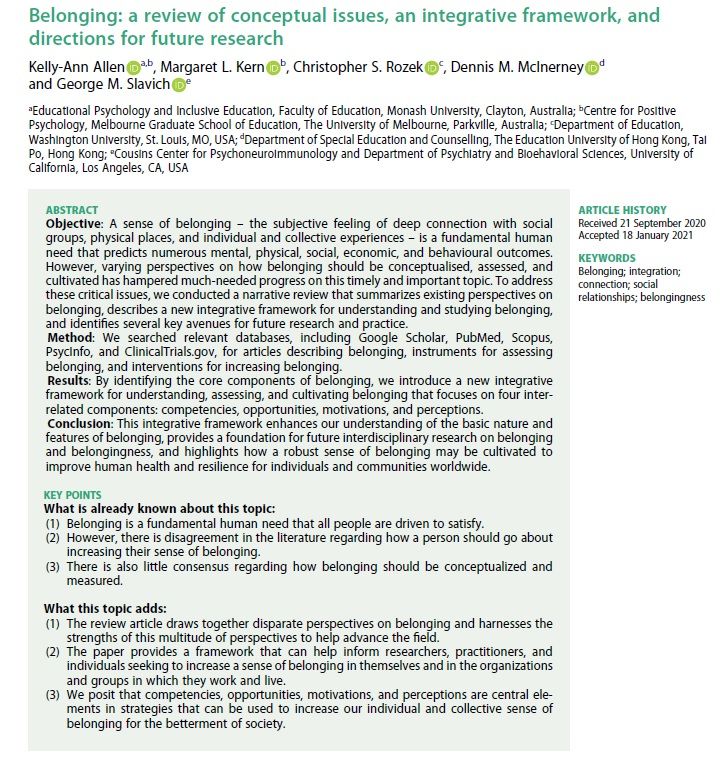
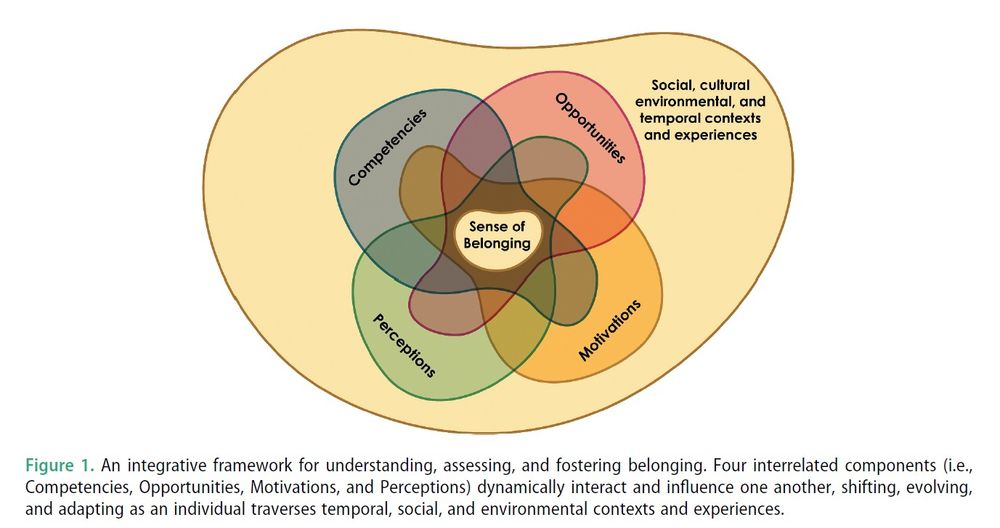
Hi! I'm a social psychologist in a Department of Education, and I'm interested in student belonging, emotions, motivation, and interventions. I mostly work with adolescents. See below for an example of my belonging theory work done with awesome collaborators :) www.tandfonline.com/doi/full/10....
27.09.2023 20:41 — 👍 13 🔁 1 💬 1 📌 0
Ph.D. candidate at the University of Louisville | Studying children’s stereotypes, motivation, and belonging in STEM | Amiable | Curious
Clinical Psych Prof @UCalgary studying child development, mental health, screens, adversity & resilience | firstgen | settler | mum
www.madiganlab.org | www.ACEsHub.org | www.copewithtrauma.org
Social psychologist, relationships enthusiast, Associate Prof at Western University 🇨🇦.
Incoming assistant professor at Yale's Department of Psychology studying identity and inequality.
Professor, Department of Psychology, New York University
Research: gender, stereotypes, motivation, explanation
President, @cogdevsoc.bsky.social
Married to @joecimpian.bsky.social
Website: https://cimpianlab.com
Psychologist for the humans of tech. Author of The Psychology of Software Teams (2026). Founder: Catharsis Consulting (strategy * science). she/her 🏳️🌈 https://www.catharsisinsight.com/
Host at: https://www.changetechnically.fyi/
Associate Professor of Psychology @ University of Kentucky 🔵⚪ | NYC 🍕 ➡️ A² ⬛ ➡️ EUG 🦆 ➡️ SEA 🌧️ ➡️ LEX 🐴 | Go Blue 〽️
postdoctoral associate | DBER | equity in science pathways for undergraduate and graduate STEM students | avid fantasy reader & gamer | views are my own | she/her
Asst. Professor of EdPsych and Assessment at the Education University of Hong Kong.
I’m interested in optimizing assessments and interventions for students' beliefs and practices to foster motivation and achievement.
Assistant Professor of Psychological & Brain Sciences at Washington University in St. Louis
Director of the Wellbeing and Emotion across the Lifespan Lab (WELLab)
Lawyer turned writer, speaker, and podcaster: Original Jurisdiction, http://davidlat.substack.com. Author, Supreme Ambitions. Founder, Above the Law. Proud Papa of two adorable boys. 🏳️🌈
In #education, #motivation matters, but not more than #context. We explore complexities at the heart of what motivates learning and where that learning happens. | VCU School of Education
A social media representation of the Applied Ed Psych subcommittee of Division 15 of the American Psychological Association.
Illuminating and amplifying the #Applied work of #EdPsychs in the US and around the world.
managed by @drtimony.bsky.social
KiDLAB (PI: Eddie Brummelman) studies the developing self. We study the nature, origins, and consequences of children’s self-views. https://kidlab.nl/
(he/him) Palestinian psych professor
@seattleu. low income first gen POC, lover of dogs and Cleveland sports.
Tweets are mine and do not represent Seattle U






